Twenty-Two years without a lost-time accident. Six-and-a-half million safe hours worked. These are some of the accolades for the AFL Accessories plant in Duncan, South Carolina. What makes this particularly impressive is the nature of work performed at this facility. Eric Borowicz, general manager of the 150K sq. foot facility affectionately refers to his team as “The Flintstones,” because in his words, “we work for a living over here. We build parts. We are a machine shop.” CNC mills, lathes, presses, and welding are a few of the machining-intensive processes that take place in his factory.
AFL Accessories joined the OpExChange in February of this year and immediately volunteered to host a plant tour. They opened their doors for a tour on March 22 and shared what they are doing to not only sustain their culture of operational excellence but also to improve upon it with both simplicity and with leading-edge technology. In his opening remarks Eric shared that he was excited to host this visit because “The OpExChange gives manufacturing a lot of opportunity … and I’m excited to get your feedback.” He also shared that, although he is not fond of consultants, his relationship with Gemba Systems opened his eyes to larger opportunities and changed how his factory now does business.
In this two-and-a-half-hour visit, AFL shared multiple areas of the operations including utilization of standard lean techniques, incorporation of practical analytics using Microsoft Power BI, 3D printing of components, a leading-edge real-time locating system, and employee engagement and retention programs.
Our People Make the Difference
The mission for AFL management is to create an environment where employees feel valued and respected and want this to be the job from which they retire. Eric shared that they truly value work/life balance at his factory. “I don’t want anybody to miss a rehearsal at school or a parent teacher conference. And I don’t want them to take vacation for this.” Because the accessories facility is a job shop, “We have the ability to allow people to have flexible time for their families without impacting their attendance.”
One of the things Eric implemented when he assumed the general manager position was beefing-up the engineering expertise within their plant. Many of their utility customers trimmed down their engineering expertise and asked AFL to include this at their plant. Eric responded by incorporating extensive testing capability including a 150,000-pound vibration test bed, shakers, tensile testing equipment, and an electrical testing lab.
Eric shared how this is helping to develop newer employees. “As an engineer, it is better to do it rather than read about it. Last year, I lost six employees. Six! Their combined seniority was 230 years with the company. That is a lot of experience to go out the door.” Eric pointed to a couple of the younger AFL engineers joining the group on the tour. “Rather than just telling them what you read or researched, go do it. Repeat it. Do it again.” When they interface with the customer, “You can tell them this is what I did rather than this is what I read.”
Some of the other employee engagement programs utilized at AFL Accessories are:
- Community Service – There are several ACT (AFL Community Team) activities available to employees, their families, and friends. AFL also will pay an employee for four hours of volunteer time. This frequently plants the community responsibility seed with the associate.
- Summer school program – AFL invites children (18 years or older) of employees to work during the summer. This gives them the opportunity to not only earn $15 per hour but also to experience working in an exciting manufacturing plant. There were eighteen that participated in 2021.
- Salaried Work – Every salaried associate works one full day each month on the factory floor. This gives the design and sales folks the opportunity to experience the impact their work plays with the workforce. It also helps strengthen the teamwork across departmental boundaries.
- Performance & Safety Bonus – Each employee is eligible for a performance bonus of up to one-thousand dollars per quarter based on revenue, profitability, and on-time delivery. The individual bonus is weighted by an absenteeism factor. Also, an additional bonus is available based on safety performance.
- Retention bonus – As a short-term remedy to wage escalation, rather than utilizing a wage increase as some neighboring plants have done, the plant implemented a retention bonus. Twice a year, employees will receive a retention bonus of 5% of their semi-annual salary.
Real Time Locating System
Emergency situations from their customers frequently necessitates expedited orders. When a natural disaster occurs, utility companies ha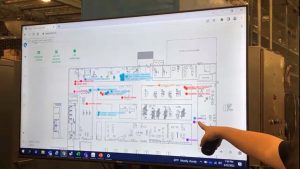 ve urgent needs for replacement parts to get the power grid operational. Tracking and managing these orders was time consuming with the existing bar-coding system. In mid-2021, they implemented a real-time locating system (RTLS) that significantly improved this. The RTLS system, implemented by Gemba Systems in Greenville, utilizes the Pozyx ultra-wide band tracking technology that tracks orders through the facility. During the tour, they demonstrated how this was utilized to track and manage orders generated from the December tornado outbreak in Tennessee.
ve urgent needs for replacement parts to get the power grid operational. Tracking and managing these orders was time consuming with the existing bar-coding system. In mid-2021, they implemented a real-time locating system (RTLS) that significantly improved this. The RTLS system, implemented by Gemba Systems in Greenville, utilizes the Pozyx ultra-wide band tracking technology that tracks orders through the facility. During the tour, they demonstrated how this was utilized to track and manage orders generated from the December tornado outbreak in Tennessee.
The system not only tracks the order, but it also generates spaghetti path charts and heat charts that indicate waiting times for orders. During this visit, a new phone app was also demonstrated that could locate the order within one inch of proximity. This system does also offer other capabilities including geofencing.
3D Printing
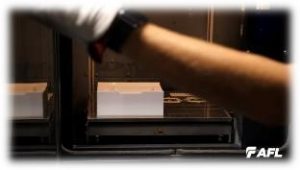 AFL is making use of additive manufacturing, better known as 3D printing, to generate rapid prototypes and parts for their customers. There are four machines in the 3D printing room, which run twenty-four hours a day, seven days a week. Although the machines are not inexpensive, their added value is phenomenal. Previously, it would cost approximately $8,000 for a mold to be created along with a nine-week lead time to generate a part.
AFL is making use of additive manufacturing, better known as 3D printing, to generate rapid prototypes and parts for their customers. There are four machines in the 3D printing room, which run twenty-four hours a day, seven days a week. Although the machines are not inexpensive, their added value is phenomenal. Previously, it would cost approximately $8,000 for a mold to be created along with a nine-week lead time to generate a part.
This was then sent to the customer who might want to make a small change which could add additional cost and time. Now, it costs them about $500 and eight hours to generate the part in-house. This is then sent to the customer who can cast parts from these. In the first eighteen months, their first machine saved them about $1.3 million of tooling cost.
Practical Analytics – Data Transformation
Joshua Schutz joined the team about seven months ago as a Commercial Operations Analyst. Part of his initial scope was to analyze pricing and contract opportunities. There was an abundance of data available at the plant, but there was no real structure or ability to meaningfully utilize the data. Under the tutelage of Gemba Systems, he harnessed the capabilities of Microsoft Power BI, Teams, and SharePoint to provide that structure. In only a few months, the team was able to put together an intuitive set of dashboards that are now used to drive decisions at the plant. These tools not only provided analytics for decision making but also freed up multiple hours each day for the management teams.
Josh provided a detailed overview of the Power BI application along with examples of how this has already impacted their bottom-line. Some of the applications he shared were revenue booking, end-user summary analysis, and underperforming gross margin dashboards.
Jon Potter, Commercial Manager with AFL stated that, “We’ve taken a pile of data and turned it into usable information and business insights that helps us become more efficient and more profitable.”
Warehouse Clean-up
Jennifer Keith joined AFL in 2017 and supervises the warehouse operations at the facility. Eric shared that when Jennifer was hired, she “stepped into a mess.” Her biggest problem was “how to attack a monster.” In her presentation in the warehouse, Jennifer delivered an overview of their improvement activities and how Gemba Systems helped her get her hands around the monster. The problems that they attacked are familiar to most manufacturers: low inventory accuracy, obsolete inventory, materials stored in aisles, part shortages causing production downtime, and other typical problems.
Jennifer and the team engaged the workforce and employed a traditional 5S kaizen methodology to identify waste and opportunities for improvement. Many action items and plans came directly from their workforce. An added tool they utilized in this kaizen was Power BI analytics. Utilizing this data, they were able to consolidate part storage into product families. Not only was this useful in identifying obsolete inventory and usage statistics, but it was also used to create a decision dashboard. This is now used to sustain their efforts. They also incorporated new storage containers to optimize vertical space on the racks. Product is no longer stored in the aisles. Jennifer shared some great before and after pictures that visually displayed the results.
Process Automation
During the facility tour, Eric showed the diversity of equipment utilized in their processes. They still have older equipment such as Bridgeports and Warner Swasey mills. However, they also have several modern pieces of equipment such as automated CNC pallet changers and robotic welder. Their robotic welder can process ten parts in the time that one is completed in their manual welding operation. More importantly, the robotic process only requires a machine loader or attendant where the standard welding process requires a highly skilled welding associate. With this automation, the newer equipment helps address a skills gap in the recruitment process.
AFL Accessories – A Classic OpExChange member!
The purpose of the OpExChange is for South Carolina manufacturers to help one another become more competitive, nationally and globally. They accomplish this through collaboration and sharing with peer manufacturers throughout the state. In their first event with the OpExChange, AFL exhibited the openness and collaborative spirit that typify a classic, contributing OpExChange member. AFL openly shared their operations, their successes and plans for improvement, and even some of the challenges they are facing.
During the visit, Eric extended an invitation to OpExChange members to contact him if they would like to do a deeper dive into any of their operations or to discuss challenges. “I am very thankful to be part of the OpExChange and I’m looking forward to visiting your plants as well. I think I can learn a lot from visiting some other folks and seeing what you do in your plants.”
The entire plant visit was video recorded. Along with the presentation files, they are available for all OpExChange member companies on the online Portal.
About OpExChange
The OpExChange, sponsored by the SCMEP, is a peer-to-peer network of companies in South Carolina known for generating success for members through benchmarking and best practices activities. Member companies host events and share practical examples of industrial automation, lean manufacturing improvements, and leadership development. It is an invaluable resource to South Carolina companies that provides access to others who are on similar improvement journeys. If you are interested in joining, contact Mike Demos (Mike@OpExChange.com) or visit the OpExChange website to see current companies: https://www.scmep-online.org/pages/memberlisting

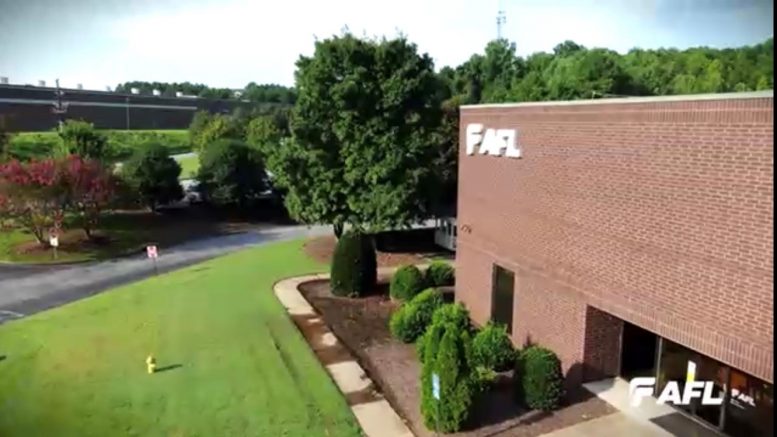
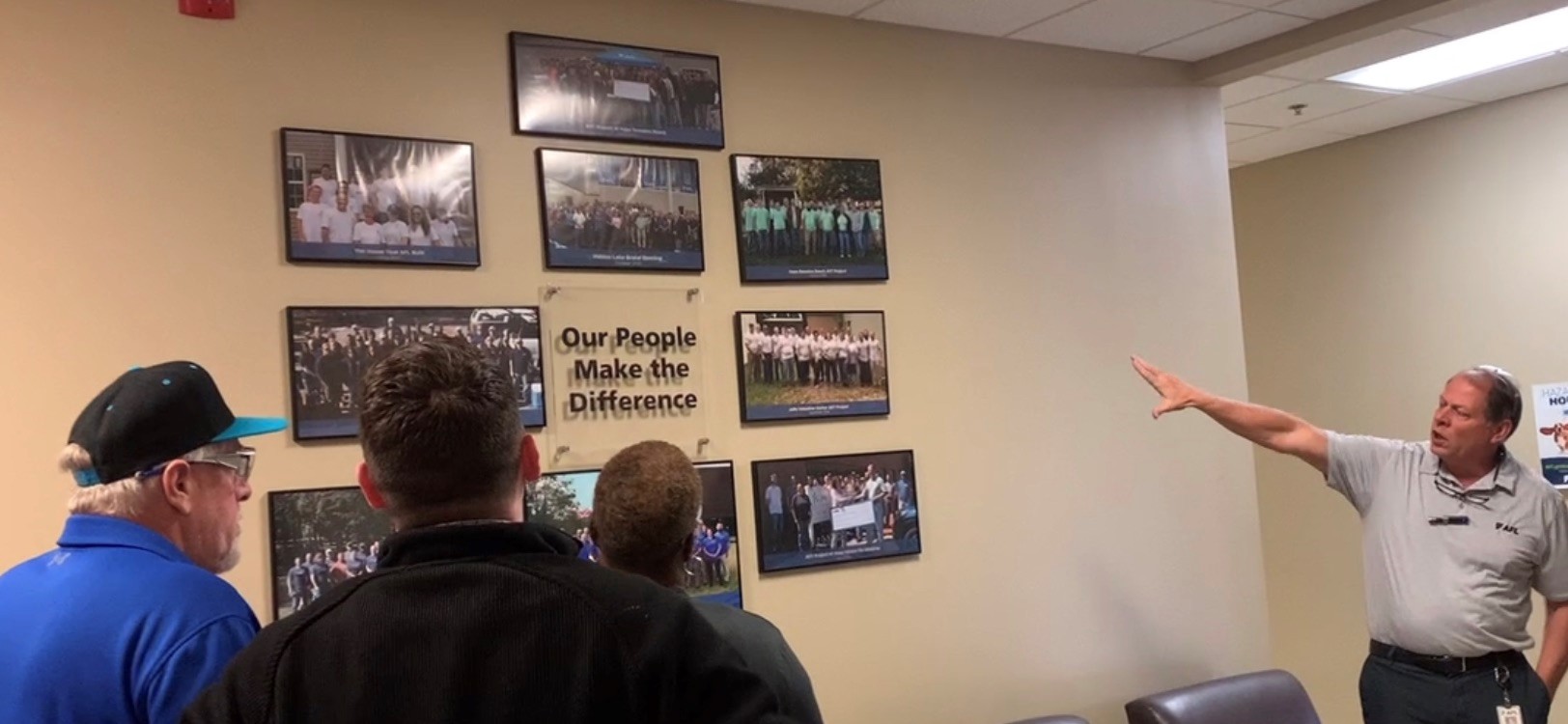
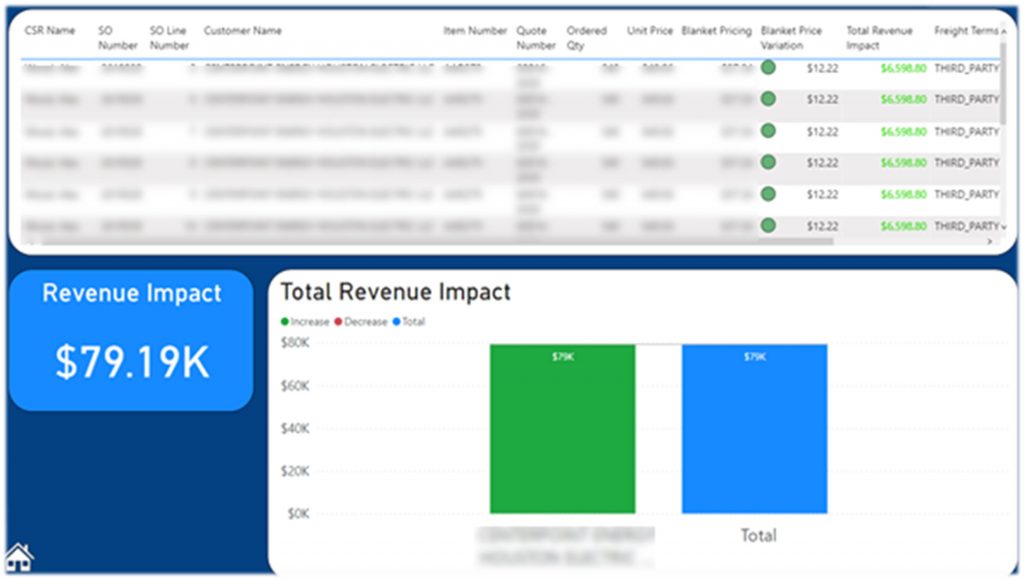


Be the first to comment on "AFL Accessories Joins OpExChange – Shares Operational Excellence"